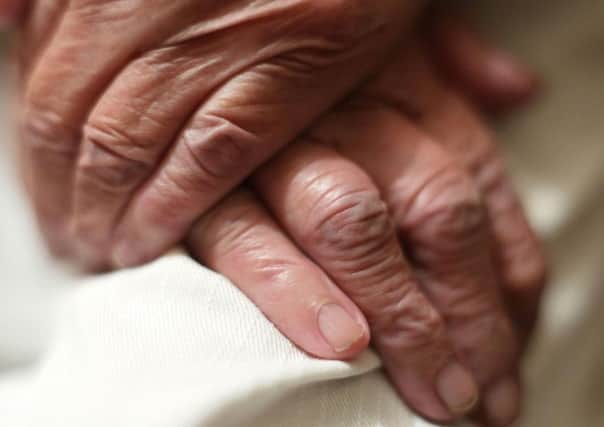YP Letters: Care crisis is failing the future


YOUR Editorial ‘We need leaders, not quangos, to fix care home crisis’ (The Yorkshire Post, September 8) was spot-on.
Sadly, the Independent Care Group has been warning for more than a decade that we are facing a crisis in social care provision – not just in local authority services but in the independent sector too – where the majority of such care is provided.
Advertisement
Hide AdAdvertisement
Hide AdSocial care has been starved of funding now for a generation and the upshot of that is starting to be felt.
Care homes – independently-owned and state – are closing and homecare providers are handing back contracts because they cannot be viably delivered. More than a million people are living with an unmet care need.
In 10 years’ time, 7.5 million people will be aged 75 and over, and a million people will be living with dementia by 2021.
So the need for creating a sustainable future for care has never been greater.
Advertisement
Hide AdAdvertisement
Hide AdThe Kings’ Fund says that over the past 15 years there have been two independent commissions, three consultations, five White and Green Papers and innumerable reports from think tanks, charities and other organisations, all into the future of social care.
As Sarah Wollaston MP, chair of the Health Select Committee, said, we have had enough reports to know what needs to be done, what is needed now is action.
If the Government was subject to the same evaluation by the Care Quality Commission as providers are, it would have been rated “inadequate”.
The Government needs to provide a proper, sustainable plan for the funding and delivery of social care services for the future and it needs to do so now before more and more of our oldest and most vulnerable people – who deserve better – have to go without the care they need.
Education in creativity
From: John G Davies, Alma Terrace, East Morton, Keighley.
Advertisement
Hide AdAdvertisement
Hide AdJAYNE Dowle (The Yorkshire Post, September 11) asks some important questions, such as “What is the purpose of education” and “What is school for”?
Her answer appears “to prepare our state-educated offspring to compete in a global marketplace”, which is not particularly surprising given today’s political climate, but is hardly an enlightened one.
For many people, education is what is done to their children, whilst they and their children have little say in the process. Humble objectives like wanting their children to get to school easily or to be happy might be an effective way of dealing with it.
It always interested me that many “low achieving” pupils were skilful games players and could do amazing tricks on skateboards and BMX bikes, indicating that they were very effective learners.
Advertisement
Hide AdAdvertisement
Hide AdSomehow conventional schooling didn’t reach them, perhaps a different approach may bring better results.
It is time for a more enlightened liberal approach that involves pupils in the pleasures of learning, being creative and solving problems.
Those children will be able to adapt to a rapidly changing world where computers and robots will totally change the face of work.
Food for thought
From: Bruce Russell, Chapel Lane, Cayton, Scarborough.
THE letter from Elaine Fretwell-Munns regarding food waste and its potential for energy production (The Yorkshire Post, September 9) made a great deal of sense.
Advertisement
Hide AdAdvertisement
Hide AdUnfortunately political leaders, and others in positions of power, have little interest in changing the status quo in the present energy production system.
They are for more concerned with protecting their own vested interests and investments in the current monopoly model, hence their support of fracking.
While the use of food waste as a potential energy source is attractive, a far more effective way of producing cheap electricity and reducing demand from the National Grid would be to pass legislation that every new build house should be fitted with solar panels during construction. I am told that to some extent this is the case in France, and is it not a French company that controls and profits from a large part of the energy production in our country?
This raises the questionable logic of privatising an industry by selling it to a foreign nationalised company.
Advertisement
Hide AdAdvertisement
Hide AdMy conclusion is that things will only change when decision- makers see their priority as being to those they are called to serve instead of to their own self-interest.
Intervene on house prices
From: Allan Sutherland, Stonehaven.
I AM on holiday in Yorkshire (trying to escape Nicola Sturgeon). Your article about housing targets said the average house price in Yorkshire is £174,710 and the average wage is £24,284. This is £1,600 per month after tax and NI.
Planning guidelines “affordable” housing say they should be 20 per cent less than other houses in a development.
Shelter’s says housing should cost less than 35 per cent of net pay, around £550.
Advertisement
Hide AdAdvertisement
Hide AdBut an average first-time buyer of an average Yorkshire home would pay a £900 per month mortgage.
To meet the Shelter target, the average price would have to be £120k.
This requires government intervention to build cheap, attractive good homes using the latest prefab methods, reining in builders who hoard land and keep prices artificially high.
The long term effect of greater supply would bring all house prices down, but it wouldn’t help those with existing mortgages.